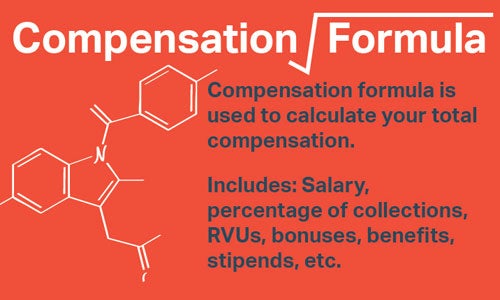Keeping Up with Physician Compensation Trends Can Help Physicians to Better Negotiate
Different physician employment models can have a significant impact on how a physician is compensated. If you’re like the 69% of physicians that are employed, then your compensation formula can look much different than a self-employed physician’s compensation package.1 If you are interested in a more in-depth look at compensation trends, annual compensation reports are a great resource for you to review.
Physician Compensation Infographic

Click the button below to download and view our Physician Compensation Infographic PDF.
When to Talk About Compensation
Knowing when to talk about compensation is just as important as knowing what to discuss. We recommend that you wait until your formal interview to discuss compensation. A good time to have the compensation conversation is after you have established mutual interest and had time to discuss the opportunity with your significant other. Discussing compensation is a strong indicator that you’re interested in the position. Asking too early often leaves employees feeling that compensation is your most important factor. Start the conversation by asking about the compensation model including any productivity components. Ask about other bonuses, PTO, and benefits that make up your total compensation package.
Compensation Formula
A compensation formula is used to calculate your entire compensation. Often it consists of many factors including; salary, percentage of collections, RVUs, bonuses, benefits, and stipends. MGMA is a common resource that employers use to determine their compensation package. Our Salary Calculator, a compilation of salary sources, can give you an idea of your expected compensation range. A thorough understanding of how your total compensation is determined is imperative and it can be complicated.
Try Our Salary Calculator
Salary
The largest component of your compensation package is your base salary, sometimes offered as a guaranteed salary for a specific timeframe. Once the guarantee ends, compensation is usually production-based. Guaranteed salary can also be combined with production-based compensation.
Income guarantees are different than guaranteed salaries. An income guarantee is usually offered by an organization that doesn’t hire you directly but contracts with you. It is more akin to a loan or an advance. You will be expected to meet certain requirements and become self-sufficient by the end of the income guarantee agreement. A gross income guarantee covers all your expenses including your salary, while a net income guarantee only covers your salary. This may be a good option if working in an existing busy practice. Your compensation will ultimately be a reflection of both revenue and expenses.
Production-based compensation is popular because it aligns the physician’s earning potential with their productivity. A very productive physician generates more revenue for their employer. Production-based compensation can be calculated using a percentage of collection, RVUs, or wRVUs. Asking about the payor mix will help you understand how and when you will be paid if your compensation is based on a percentage of collections.
Relative Value Units (RVUs), are a national standard used for measuring productivity, budgeting, allocating expenses, and cost benchmarking. RVUs represent the relative amount of physician work resources and expertise needed to provide services to patients. Employers can look at national numbers or regional numbers when determining compensation based on RVUs.
A work RVU (wRVU) is different from an RVU because it is used to determine the value of work performed by the physician or provider and is not based on reimbursements. A dollar amount is assigned to the wRVU and compensation is based on how many wRVUs you accumulate. The work RVU is related to the direct expenses associated with what the physician receives for payment in salary and direct benefits.
Earning Potential
If your compensation is production-based, you should discuss your earning potential with your prospective employer. Ask what level of productivity is needed to maintain a certain income and how long will it take to reach that level of production. Is there an opportunity for you to earn more by taking on additional patient volume? Another factor that can have a large impact on your earning potential is the possibility of an additional role within the organization, which will boost your income, known as stacking.
Incentives and Benefits
Student loan forgiveness is an incentive that is gaining in popularity for physicians. There are many different types of student loan forgiveness sponsored by national, state, and local governments, as well as private organizations and employers. They range from the Indian Health Services to Public Services Loan Forgiveness, each has different requirements, but most have a commitment of service. Your employer may offer student loan repayments as a hiring incentive which may be paid over the course of your years of employment.
Generally, Paid Time Off (PTO) about 3-4 weeks is offered depending on experience. PTO may be negotiable. Ask if your PTO includes sick days and CME days, or if protected CME time is granted.
Health, dental, and vision insurance coverage should be offered by most healthcare organizations, but occasionally an independent practice may require you to obtain your own coverage. Health insurance is costly and there are many variables involved, you will want to know the type and cost of the coverage that is being offered. This is a part of your overall compensation that can end up saving you or costing you money in the long run.
Another incentive offered by healthcare organizations is Malpractice/Liability Insurance (MPLI). The cost varies based on your specialty and location where you practice. If you want to work independently and pay your own premiums, you might want to choose a state with lower rates. If you’re set on practicing in a state with a high rate, find an organization that covers MPLI.
Retirement benefits are usually given in three ways; a pension, 401k, or 403b. A 403b will be offered by a nonprofit organization and works like a 401k. 403b plans allow for a “catch-up” deferral for anyone 50 or older. Make sure you’re aware of your retirement plan limits. As always, it’s best to consult with an expert if you have any questions. With the right planning, you may be able to retire early.
Sign Up for Job Alerts
Stipends
Stipends are typically paid out as reimbursement expenses. A Relocation Stipend is paid out to cover the costs associated with relocating for a new position. This money can be paid to you, the moving company, or both. A Vehicle Stipend might be offered if the position requires practicing at several locations or if travel is an expected part of the position. It is paid to cover fuel and maintenance for your vehicle. A travel stipend is used to pay for airfare and other travel expenses. A Housing Stipend is uncommon, but may be a possibility if housing in the area is limited and expensive or your position requires you to be on call and close to the facility. Other stipends include residency, faculty, and leadership roles such as Medical Director. Depending on the way the stipend is paid it may have tax implications for you, so it is best to consult a tax professional.
Bonuses
There are one-time bonuses like a Sign-on Bonus, Commencement Bonus, or Retention Bonus. Some can be based on meeting goals such a Quality Bonus. It’s important to fully understand what is available and when it is paid out. Quality bonuses are usually based on patient satisfaction but can also be based on throughput time or paperwork completion. If a bonus based on meeting a goal is offered, ask how many employees are earning that bonus. An extra bonus sounds great during negotiations but if it’s unattainable, it shouldn’t be considered when comparing compensation.
Schedule
Your schedule should be part of the compensation conversation. Make sure your schedule fits your lifestyle. If it doesn’t, chances are there is a position available that does. Looking for a 4-day work week, no call, or no clinic time? Options exist with many organizations offering flexible schedules to entice candidates and organizations even limit patient volume. This ensures that you aren’t overloaded with patients and paperwork.
While this can conflict with production-based compensation, it can lead to a better quality of practice and better work/life balance. If you do take a position with a limited schedule, you may have the opportunity for additional practice options. Multiple streams of income can be a great way to earn extra income but might lead to burnout. If you’re ready to accept leadership responsibilities, you can spend less time with patients and more time with colleagues or on administrative work. Accepting a teaching or leadership position can have a huge impact on your schedule as well as the possibility of a higher guaranteed salary or better benefits.
How Location Affects Compensation
Location plays a big role in your compensation. Physicians are in demand across the country but even more so in rural areas. Hospitals and healthcare facilities in large urban areas especially with a medical school offer less competitive compensation packages due to the strong pipeline of candidates.2 Some organizations will offer higher sign-on bonuses and incentives like student loan forgiveness to attract candidates. Location affects salary, RVUs, bonuses, and benefits. It is in your best interest to be flexible when it comes to location. Instead of focusing on a specific city, think about what attracts you to that city. Then look for other locations that share similar characteristics and amenities.
Reviewing Your Offer
Your offer will come as either a letter of intent or as a contract, usually with a deadline. A letter of intent is an interim step of the hiring process and precedes receiving a contract. If you are going to have an attorney look over your offer, choose one that is knowledgeable and can commit to a reasonable turnaround time. You may find that it’s beneficial to meet with an accountant to understand your tax burden and options. Some bonuses can be paid quarterly and can even be deferred for tax reasons. Check to see if there are any penalties if you leave your position before your contract is finished. Some stipends and bonuses have clauses outlining penalties and repayment terms.
Negotiating
Remain realistic when it comes to negotiating. If you are dealing with a small organization there might be more options like increasing PTO in lieu of a higher salary. There might not be any terms that are negotiable. Your terms will be outlined in the Letter of Intent (LOI), negotiate your compensation and benefits when you receive your LOI instead of waiting until you receive the contract. If terms are not clearly outlined in the LOI, or you didn’t receive one, don’t be afraid to ask. Negotiating is based on each individual organization. Some may be open to changing terms, others will not change their standard contract.
Once you sign your contract, keep a copy for your records.
Getting Help with The Whole Process
The process can be complicated and overwhelming especially for busy physicians. Never be afraid to clarify any issues before you sign a contract. The goal is for you to find an organization that is a perfect fit for you and your family. A physician recruiter can help you through the whole job search process. From helping you find the right opportunities to signing the contract, their expertise is invaluable.
- “2018 Compensation Overview” Medscape, 2018. https://www.medscape.com/slideshow/2018-compensation-overview-6009667
- “Second Annual Physician Compensation Report” Doximity, March 2018. https://www.doximity.com/careers/compensation_report



